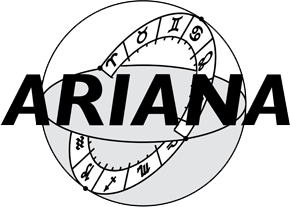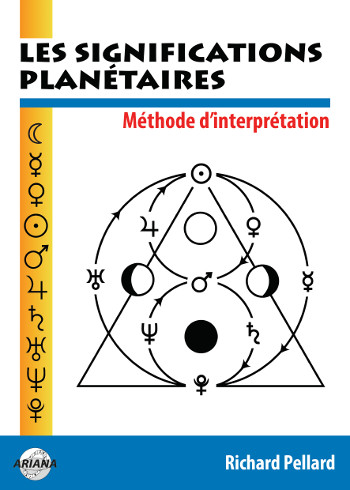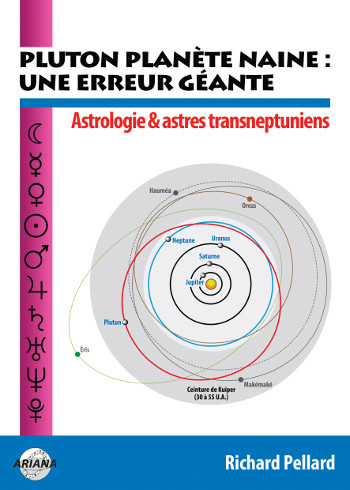Your Planets
Portraits of the Planets
Aspects between Planets
The planetary ages
The planetary families
Planets in Signs
The Planets in comics


The interpretation examples that we are suggesting are very far from being exhaustive: they only show and outline a general frame describing the issues of the planetary family. They should therefore not be taken literally. Each being brings indeed its own responses, more or less original, to the questions raised by a planetary family. There is no magic formula. Through using the R.E.T. and of the Theory of Ages and combining logic, observation and imagination, you will be able to develop a thousand other possible meanings, a thousand other variations on the same theme.
How the known, the conscious, the norms, codes, concepts, theories, models, goals, projects, images, principles, symbols (‘R’) are reproduced and maintained (‘r’) by conditioning and determining a priori our way of being moved, feeling and experiencing (‘e’) and to question ourselves, to ask ourselves questions and to open ourselves to the unknown (‘t’).
Positive formula (“big R” or “extensive R”): Need to be recognized, accepted, respected or admired beforehand in order to open up to emotional exchanges and varied encounters. To be structured by models so stable and certainties so strong that it seems quite natural to concretize them and to question the world from them and from them alone. The control of its public image allows a great relaxation of attitudes. To impose itself by its charm and its casualness, to be a center of interest by its seduction and its open-mindedness. Be sociable, spontaneously available to the solicitations and temptations of the outside world without losing sight of a dominant objective. Images or theories considered a priori interesting arouse a thousand emotions and speculations, sources of incessant discoveries and wonders.
Negative formula (“non-E, non-T” or lack of Extensive existence and of Extensive Transcendence): lack or rejection of the sense of the concrete and the prospective imaginary. Realism and inspiration are down. Hence the excesses ‘R’: dependence on the opinion of others, suggestibility, tendency to believe that all problems can be solved through communication, gentleness and good manners.
Take the example of a new born. As soon as he leaves his mother’s womb, he becomes part of a socio-cultural universe that existed long before his birth. This universe which he passively inherits is structured by prior representations (source-level ‘R’). These representations are conveyed by the mother tongue, which diffuses a certain vision of the world made up of habits and customs, memories, myths and legends, as well as laws, codes, norms and principles of education which imply certain manners. to behave in society, to speak, to act or to think which vary very significantly according to social or family backgrounds, civilizations, places and times.
During the first month of life, all babies make exactly the same sounds, i.e. speak the same language; after a year, they only consider as significant and only pronounce the words and sounds of their mother tongue. During the same period, there were accustomed to a decor, colors, gestures, a way of dressing and expressing oneself. They learned that certain behaviors are permitted and others prohibited, and understood that it is better, in order to be accepted, recognized, celebrated, rewarded and applauded, that is to say socially adapted, to imitate their parents: thus transmits, from early childhood, the socio-cultural heritage. Language, myths, social norms, culture: we are indeed in the universe of Representation as a source level.
Over there solar function (‘rR’, representation of Representation), we thus learn to faithfully reproduce (goal-level ‘r’) the language and norms that existed before us and have been transmitted to us (source-level ‘R’). Over there mercurian function (‘tR’, transcendence of Representation), our ability to surprise ourselves, to question ourselves, to formulate hypotheses or to imagine new possibilities (goal-level ‘t’) is structured at source by the language and standards we inherited (source-level ‘R’). Finally, by the venusian function (‘eR’, existence of Representation), our way of feeling, of experiencing, of being moved (goal-level ‘e’), far from being “natural”, is also conditioned, influenced at the base by the mother tongue (source-level ‘R’) and the social norms it conveys…
Language, socio-culture and its norms pre-exist us (source-level ‘R’) and diffuse into us (extensiveness) as soon as we come into the world: we are there in the universe of Extensive Representation. Whether we are aware of it or not, whether we like it or not, it decides for us what is beautiful or ugly, good or bad, good or bad. An African living in the bush does not have the same aesthetic, moral or gustatory conceptions and perceptions as a European living in a megalopolis: each culture and each environment diffuse (extensiveness) a language and social standards (source-level ‘R’) different.
The assimilation of language and socio-cultural norms are essential prerequisites for the development of sociability: if I do not share the same language as my neighbour, if I do not respect the same norms and codes, it is practically impossible for me to establish contact, to meet him, to communicate with him. This is why Extensive Representation is related to spontaneous sociability, which implies that we can immediately understand each other because we have the same implicit references.
Of course, it is not the Sun, Mercury and Venus that create languages and socio-cultural standards, but it is these three planetary functions that electively sensitize us to it.
When these three Planets are dominant in the chart of an individual, they make him a fundamentally and spontaneously sociable being, but this sociability is subject to a precondition: to affirm his identity, his individuality, his uniqueness (Sun, level-goal ‘r’ for “representation”), to share their feelings, their feelings, their emotions (Venus, level-goal ‘e’ for “existence”), communicate their ideas, their questions, their points of view (Mercury, level-goal ‘t’ for “transcendence”), it needs to be recognized beforehand, esteemed, to be the object of sustained attention, to know that it will be understood from the outset because it is on a ground of knowledge (level-source “Representation”). If he communicates, it is not to create the conditions of an agreement, but because he is a priori convinced that there is a tacit understanding between him and the other, an initial common point of view, an identical representation of the world, and that he therefore does not risk being denied, rejected, misunderstood. To give the best of himself, it is therefore essential for him to be persuaded that people believe in him, that he is shown an esteem free from any ulterior motive.
He disseminates his certainties, his principles and his vision of the world in a way that is at once solemn, affirmative (Sun), sensitive, moving (Venus) and fun, relaxed (Mercury). It is essential for him to have his merits recognized, to win the admiration of others through his exemplary behavior (Sun), his power of seduction (Venus) and his availability for the most varied encounters (Mercury). He also diffuses the image, the appearance that he wants to give of himself, an image that he strives to make at the same time irreproachable (Sun), sensorially attractive (Venus) and intellectually curious (Mercury). In one way or another, he must shine in society: to make himself interesting, to become a pole of attraction, a central character, he knows how to alternately or at the same time be convincing, charming and funny. Having easy admiration, he willingly allows himself to be touched, amused, amazed. His vigilance with regard to what seems essential to him (a being, an idea, an ideal) does not prevent him from always remaining relaxed and available and, although narcissistic, he knows how not to take himself seriously, to have fun of his own character… or play several depending on his interlocutors. A word, an image, a fortuitous clue is enough to awaken in him disturbing sensations or multiple reflections and questions.
| Subject | Object | Relationship | Integration |

| Excitability | Signal | Communication | Symbol |
| High level Medium level Low level |
Simple Compound Complex |
Representation Existence Transcendence |
Unique Duel Multiple |
| Energy | Space | Time | Structure |
▶ The Solar: Psychological profile
▶ The solar function ‘rR’ (representation of Representation)
▶ Sun-Mars-Pluto: extensive Power
▶ Solar stage (from 7 1/2 months to 1 year old): the age of identification
▶ Sun-Jupiter-Uranus: intensive representation
▶ Pouvoirs de Soleil-Lune : le Soleil
▶ Apollon et son ombre : quand le Soleil se fait violence
▶ The Mercurian: Psychological profile
▶ The mercurian function ‘tR’ (transcendence of Representation)
▶ Mercurian stage (from 1 to 3 months old): the age of communication
▶ Mercury-Saturn-Pluto: intensive transcendence
▶ Dès deux mois, le réseau du langage est en marche
▶ L’Esprit Mercure de C.G. Jung : une leçon de symbolisme
▶ The Venusian: Psychological profile
▶ The venusian function ‘eR’ (existence of Representation)
▶ Venusian stage (from 3 to 7 1/2 months old): the age of affection
▶ Venus-Mars-Neptune: intensive existence
▶ Sun-Mercury aspect
▶ Sun-Venus aspect
▶ Mercury-Venus aspect

Les significations planétaires
par
620 pages. Illustrations en couleur.
La décision de ne traiter dans ce livre que des significations planétaires ne repose pas sur une sous-estimation du rôle des Signes du zodiaque et des Maisons. Le traditionnel trio Planètes-Zodiaque-Maisons est en effet l’expression d’une structure qui classe ces trois plans selon leur ordre de préséance et dans ce triptyque hiérarchisé, les Planètes occupent le premier rang.
La première partie de ce livre rassemble donc, sous une forme abondamment illustrée de schémas pédagogiques et tableaux explicatifs, une édition originale revue, augmentée et actualisée des textes consacrés aux significations planétaires telles qu’elles ont été définies par l’astrologie conditionaliste et une présentation détaillée des méthodes de hiérarchisation planétaire et d’interprétation accompagnées de nombreux exemples concrets illustrés par des Thèmes de célébrités.
La deuxième partie est consacrée, d’une part à une présentation critique des fondements traditionnels des significations planétaires, d’autre part à une présentation des rapports entre signaux et symboles, astrologie et psychologie. Enfin, la troisième partie présente brièvement les racines astrométriques des significations planétaires… et propose une voie de sortie de l’astrologie pour accéder à une plus vaste dimension noologique et spirituelle qui la prolonge et la contient.
Téléchargez-le dès maintenant dans notre boutique

Pluton planète naine : une erreur géante
par
117 pages. Illustrations en couleur.
Pluton ne fait plus partie des planètes majeures de notre système solaire : telle est la décision prise par une infime minorité d’astronomes lors de l’Assemblée Générale de l’Union Astronomique Internationale qui s’est tenue à Prague en août 2006. Elle est reléguée au rang de “planète naine”, au même titre que les nombreux astres découverts au-delà de son orbite.
Ce livre récapitule et analyse en détail le pourquoi et le comment de cette incroyable et irrationnelle décision contestée par de très nombreux astronomes de premier plan. Quelles sont les effets de cette “nanification” de Pluton sur son statut astrologique ? Faut-il remettre en question son influence et ses significations astro-psychologiques qui semblaient avérées depuis sa découverte en 1930 ? Les “plutoniens” ont-ils cessé d’exister depuis cette décision charlatanesque ? Ce livre pose également le problème des astres transplutoniens nouvellement découverts. Quel statut astrologique et quelles influences et significations précises leur accorder ?
Enfin, cet ouvrage propose une vision unitaire du système solaire qui démontre, chiffes et arguments rationnels à l’appui, que Pluton en est toujours un élément essentiel, ce qui est loin d’être le cas pour les autres astres au-delà de son orbite. Après avoir lu ce livre, vous saurez quoi répondre à ceux qui pensent avoir trouvé, avec l’exclusion de Pluton du cortège planétaire traditionnel, un nouvel argument contre l’astrologie !
Téléchargez-le dès maintenant dans notre boutique